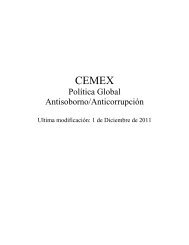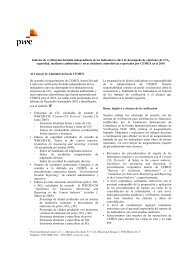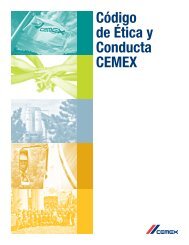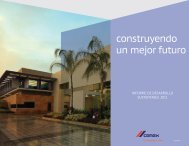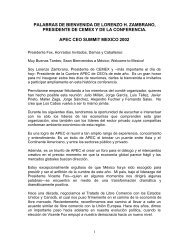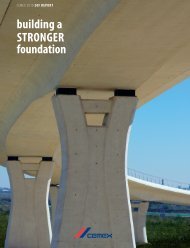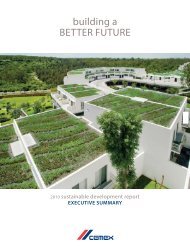CEMEX Position on Aggregates Recycling
CEMEX Position on Aggregates Recycling
CEMEX Position on Aggregates Recycling
Create successful ePaper yourself
Turn your PDF publications into a flip-book with our unique Google optimized e-Paper software.
Recycled <strong>Aggregates</strong> and Regulati<strong>on</strong><br />
<str<strong>on</strong>g>CEMEX</str<strong>on</strong>g>’s POSITION<br />
The Issue<br />
Sustainable C<strong>on</strong>structi<strong>on</strong> Regulati<strong>on</strong><br />
The topic of recycled aggregates is becoming more and more important in the c<strong>on</strong>structi<strong>on</strong> industry<br />
worldwide. Progressive depleti<strong>on</strong> of natural resources, increasing barriers to the development of<br />
<str<strong>on</strong>g>CEMEX</str<strong>on</strong>g>´S POSITION<br />
new quarries, and growing awareness of sustainable waste management gives ever-increasing<br />
relevance to the use of recycled aggregates in the c<strong>on</strong>structi<strong>on</strong> sector. While this process has a<br />
country-specific momentum and scale, it is expected that materials coming from different types of<br />
wastes will become a substantial part of the market for c<strong>on</strong>structi<strong>on</strong> materials in the near term.<br />
<str<strong>on</strong>g>CEMEX</str<strong>on</strong>g>’s <str<strong>on</strong>g>Positi<strong>on</strong></str<strong>on</strong>g><br />
In order to optimize the societal benefit of recycled aggregates, the following factors should be<br />
taken into c<strong>on</strong>siderati<strong>on</strong> when developing or updating regulati<strong>on</strong>s covering this issue.<br />
Standards<br />
Mandatory standards and norms: It is critical to develop a set of standards for the producti<strong>on</strong> and<br />
use of recycled aggregates that, <strong>on</strong> <strong>on</strong>e hand, allows the full exploitati<strong>on</strong> of the potential of recycled<br />
aggregates and, <strong>on</strong> the other hand, ensures an acceptable level of quality and transparency. A<br />
good example is a country such as Germany, where the issue of recycled materials has already<br />
been addressed. Different requirements for recycled aggregates have already become part of the<br />
most important norms regulating usage of c<strong>on</strong>structi<strong>on</strong> materials such as DIN 4226-100: Norm for<br />
all aggregates used in c<strong>on</strong>crete and mortar; DIN EN 206 & DIN 1045: European and German<br />
c<strong>on</strong>crete standards; and TL Gestein-StB: Technical supply requirements for aggregates in road<br />
c<strong>on</strong>structi<strong>on</strong>.<br />
Voluntary standards associated with sustainable c<strong>on</strong>structi<strong>on</strong> soluti<strong>on</strong>s (e.g., LEED,<br />
BREEAM): The main influence <strong>on</strong> the creati<strong>on</strong> of incentives to use recycled aggregates is the<br />
eminent sustainable character of such types of materials. Waste-based materials may be<br />
c<strong>on</strong>sidered to be privileged over natural aggregates and awarded additi<strong>on</strong>al points, which lead to<br />
increased interest and use by companies willing to comply with LEED / BREEAM certificates.<br />
Voluntary standards should also have an acceptable level of quality, as well as a transparency<br />
comp<strong>on</strong>ent.<br />
<str<strong>on</strong>g>CEMEX</str<strong>on</strong>g>´s <str<strong>on</strong>g>Positi<strong>on</strong></str<strong>on</strong>g> <strong>on</strong> Recycled <strong>Aggregates</strong> and Regulati<strong>on</strong>
Waste management legislati<strong>on</strong><br />
Since recycled aggregates originate from different types of wastes, policies regarding waste<br />
management play a key role in determining which waste volumes will be redirected to the<br />
c<strong>on</strong>structi<strong>on</strong> industry. The comm<strong>on</strong>ly adopted waste management hierarchy, “Reuse – Recycle –<br />
Recover – Landfill,” is a cornerst<strong>on</strong>e for nati<strong>on</strong>al and multinati<strong>on</strong>al legislative acti<strong>on</strong>s toward<br />
sustainable waste management. From many tools that states have at their disposal, setting either<br />
maximal land filling quotas or minimal recovery levels <strong>on</strong> demoliti<strong>on</strong> wastes (or any other waste<br />
types that may be a source of aggregates) is crucial for the development of recycled aggregates.<br />
Such regulati<strong>on</strong>s can also be strengthened by setting high land filling taxes as a barrier, which<br />
forces waste owners to find more sustainable soluti<strong>on</strong>s and also positi<strong>on</strong>s recycled aggregates’<br />
processing cost as a favorable alternative when compared to land filling.<br />
Balance between primary and recycled aggregates<br />
While recycled aggregates could play an important role in making our societies more sustainable,<br />
we must not forget that, due to technical restricti<strong>on</strong>s, as well as their relative availability, recycled<br />
aggregates will never be able to fully replace primary aggregates. The access to primary<br />
aggregates must, therefore, be guaranteed and should not be obstructed by excessive levies <strong>on</strong><br />
extracti<strong>on</strong> of minerals or unnecessarily complex permitting processes.<br />
Looking Forward<br />
The scope and potential for the use of recycled aggregates depends <strong>on</strong> many factors from country<br />
to country, ranging from regulatory frameworks to material availability. The most representative<br />
examples within <str<strong>on</strong>g>CEMEX</str<strong>on</strong>g> are our Northern Europe operati<strong>on</strong>s, with demoliti<strong>on</strong> waste recycling in<br />
Germany, Austria, and France and coal shale trading in Poland.<br />
<str<strong>on</strong>g>CEMEX</str<strong>on</strong>g> is undertaking many acti<strong>on</strong>s across our network to increase the use of recycled aggregates<br />
and make it a substantial part of its business. This is an important lever for our company to<br />
maximize the efficient use of natural resources and deliver products that resp<strong>on</strong>d to our customers’<br />
growing envir<strong>on</strong>mental expectati<strong>on</strong>s.<br />
<str<strong>on</strong>g>CEMEX</str<strong>on</strong>g>´s <str<strong>on</strong>g>Positi<strong>on</strong></str<strong>on</strong>g> <strong>on</strong> Recycled <strong>Aggregates</strong> and Regulati<strong>on</strong>



